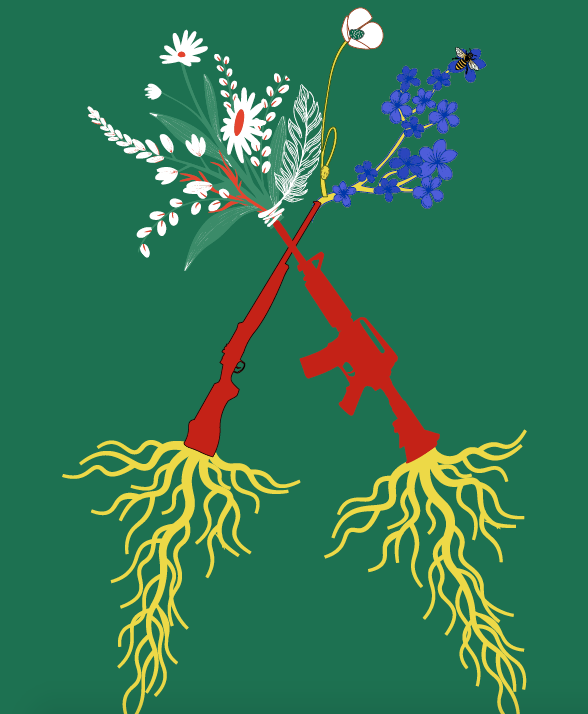
‘Visualising Peace’ is a Vertically Integrated Project directed by Prof. Alice König. We are a cross-disciplinary team of students, based in a range of Schools at the University of St Andrews, working together to expand the scope of the Visualising War project. Shifting our focus from how representations of war impact broader attitudes towards conflict, we are investigating conceptualizations of peace across different academic disciplines and broader domains of human activity. In doing so, the Visualising Peace project seeks to research, challenge and stretch habits of imagining, understanding, representing and working towards peace.
The very concept of ‘peace’ is highly contested. For this reason, we have worked hard to explore and amplify a diverse range of perspectives and understandings of peace. Our first output was The Visualising Peace Library, an online bibliographic resource designed to shed light on how differently peace is conceptualised and studied in fields as diverse as International Relations, Classics, Psychology, Comparative Literature, Film Studies, History, English, Biology, Divinity, Philosophy and Social Anthropology. Our library is being added to all the time and currently contains over 150 sources, comprising academic journals, books, articles, commentaries, blog posts, podcasts, and reports by NGOs. Our aim is to help others – whether experienced peacebuilding practitioners or simply those with an interest in better understanding the concept of peace – to appreciate and compare the varying understandings of peace that are central to and promoted by different fields of study.
As committed ‘citizen scholars’, we also wanted to move beyond the narrow sphere of academia and curate a resource that was more accessible and included narratives of peace which are traditionally omitted from formalized research. This virtual museum is the product of our on-going collaborative work, bringing together diverse perspectives on how peace gets imagined and represented in different media, contexts, periods and places. Each entry represents an individual visualisation of peace that often transcends the symbols traditionally associated with peace. They challenge our existing perceptions of conflict resolution, peace-building, peace-keeping and peace itself, and they push us to consider concepts that tend to be overlooked, such as what peace in cyber and outer space might look like. You can find out more in this virtual tour.
Ultimately, our emphasis on individual interpretations and actualisations of peace seeks to demonstrate that peace-making is not limited to governments, international forums, or large-scale non-governmental organizations. Rather, even the smallest individual initiatives and actions can have profound impacts. The goal of our Museum of Peace is not only to prompt critical reflection on existing habits of conceptualising peace, their gaps and shortfalls, and their real-world impacts. It is also to spark broader conversations with the wider public – with you, our museum visitors – about how we might understand, imagine and work towards peace in future, in inclusive and sustainable ways.
If you would like to find out more about the Visualising Peace project and get involved in upcoming activities, be sure to follow our Instagram, Facebook and Twitter pages where we will post regular updates. And if you enjoyed looking around our museum or would like to tell us a bit about what peace means to you, please fill out our feedback form.
We couldn’t have created this museum without lots of support. We are so grateful to the children, artists, poets, authors and campaigners who have kindly given us permission to feature their work in our museum: among others, Shamsia Hassani, Emily Mayhew, Omar Mohammed, Nora Nadjarian. Sincere thanks go to Zofia Guertin for her work on our banner and to Toni Andres for WordPress advice. We also owe a huge debt of thanks to Mary Woodcock Kroble for doing so much behind-the-scenes work on the website. It would not exist without her!
Student team
We are all based at the University of St Andrews, studying for different degrees in different years. In no particular order, we are:
Cohort 1 (2022): Elena Balsera, International Relations and Modern History; Grace Bitner, International Relations; Federica Consiglio, Comparative Literature and International Relations; Lia Da Giau, Sustainable Development; Zoe Du Bois, Classics and Film Studies; Marios Diakourtis, English; Arden Henley, English; Mathias Katsuya, Arabic and International Relations; Otilia Meden, International Relations; Claire Percival, Modern History and Social Anthropology, Harris Siderfin, International Relations and Psychology; Pia Tiwari, International Relations and Social Anthropology.
Cohort 2 (2022): Margaux de Seze, International Relations and Social Anthropology; Kara Devlin, English and Medieval History; Thomas Frost, English; Arden Henley, English; Shengyuan Ji, International Relations and Social Anthropology; Maddie McCall, International Relations; Otilia Meden, International Relations; Harris Siderfin, International Relations and Psychology; Eleni Spiliotes, Art History; Joe Walker, International Relations.
Cohort 3 (2023): Margaux de Seze, International Relations and Social Anthropology; Aimee Capraro, Arabic and German; Katerina Chree, Psychology; Eoin Cotuk, English; Isabel Frasier, International Relations and Economics; Christy Foreshaw, English; Thomas Frost, English; Arden Henley, English; Shengyuan Ji, International Relations and Social Anthropology; Mathias Katsuya, Arabic and International Relations; Viktor Lopez-Roso, International Relations and Italian; Otilia Meden, International Relations; Eleni Spiliotes, Art History; Joe Walker, International Relations; Kim Wahnke, Philosophy.
Cohort 4 (2023): Jadzia Allright, Geography and Social Anthropology; Dylan Buchan, International Relations and Psychology; Lia da Giau, Sustainable Development; Hana El Hilaly, International Relations and Film Studies; Samuel Huff, International Relations; Otilia Meden, International Relations; Robert Rayner, Philosophy; Madighan Ryan, International Relations and Sustainable Development; Jazmin Smallridge, Management and Philosophy; Albert Suriñach I Campos, Classics; Tao Yazaki, English and Modern History; Kim Wahnke, Philosophy.
Cohort 5 (2024): Ideja Bajra, Biology; Lia da Giau, Sustainable Development; Zoe Gudino, Psychology; Teddy Henderson, Biology; Samuel Huff, International Relations; Valerie Kniazeva, Art History and French; Jakub Lewandowski, International Relations; Sofia Lobue, International Relations; Otilia Meden, International Relations; Anna Pilgrim, Classics; Madighan Ryan, International Relations and Sustainable Development; Jazmin Smallridge, Management and Philosophy; Tabitha Stuart, Divinity; Albert Suriñach I Campos, Classics; Tao Yazaki, English and Modern History; Kim Wahnke, Philosophy; Finlay Whitton, Psychology.
PG/UG Mentors
Jenny Oberholtzer (2022)
Harris Siderfin (2023)